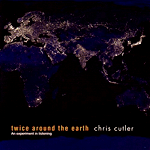play | buy
reviews
“Cutler's document suggests that when the sounds
around us are so intrinsically interesting, there's no need to frame them
with structure or artifice.”— Pitch Fork Media
Pitch Fork Media
Record what you're doing right now. Don't worry about the
fidelity, just hit "record" on your walkman or minicassette
player, attach it to your pocket and we'll take care of the rest. Yes,
I'm interested in what you get on tape. I really do want to hear how your
refrigerator door sounds, and what's playing on television through the
wall. The traffic outside is of particular interest, as is the conversation
of whoever might be sitting nearby, or across the hall, or downstairs.
When you have about thirty minutes, stop the tape, and send it to me.
Don't worry, I'll take the best snippet, and immortalize your mundane
vignette. In fact, ask a couple of your friends to do the same thing,
and I'll make all of you stars. Avant-stars!
If this sounds like a waste of time, maybe you need some convincing. British
experimental musician Chris Cutler (Henry Cow, Art Bears, Pere Ubu, head
of ReR Records) has assembled some of the most interesting aural moments
in the lives of other like-minded musicians. He did this for Out of the
Blue Radio, a broadcast project funded by the London Musicians Coop from
July 2002 to July 2003, using snippets of sound taken from all over the
world. The only catch was, his contributors had to record their sound
during the time the broadcast would air-- 11:30 pm to midnight, in whatever
time zone the person lived. Cutler took the 30-minute records and aired
them for the program, unaltered. Think of it as reality entertainment
of a sort.
For Twice Around the Earth, Cutler went a step further, editing 43 of
the recordings he received into short snippets, and arranged them chronologically
into the lengthy title track. Additionally, the piece follows the contributors
geographically, acting as a sound guide, literally twice around the world.
On this CD, Cutler also includes his recording "Lux", taken
from in the inside of a cafeteria, and "Blue Winter": Thirty-four
more contributor recordings selected and arranged by Cutler and kindred
spirit/engineer Bob Drake.
Since both "Twice Around the Earth" and "Blue Winter"
feature dozens of short, physically disconnected segments of sound, you
might expect a dizzying, disorienting experience. Far from it: the segments
tend to dissolve into one another, and the overall effect is one of constantly
shifting, but ever blending still life. The opening of the title track,
the Blue Radio theme, replete with clock tower chimes, segues seamlessly
into English composer John Scott's jogging along the Thames, which in
turn transforms into David Lee Myers' Frog Lake, New York soundscape of,
yes, frogs and crickets, moving right along to experimental sound design
artist Thomas Dimuzio in San Francisco recording the noise outside his
window, only to erupt in Hardy Fox's recording of piano at the Musee Mechanique,
also in San Francisco. This is the pace of "Twice Around the World":
technically breathless, but in practice, more like an ambient night train.
The quieter moments (like Otomo Yoshihide's short Tokyo apartment recording,
or the Hafler Trio's Andrew Mackenzie recording the Reykjavik air across
the street from Björk's place) never seem far removed from the more
boisterous ones (Jon Rose's overheard nightlife conversation in Australia,
or the bizarre electronic noise of Haco and Christopher in Kobe, Japan),
even when I know they're different in almost every way.
Cutler's "Lux" unfolds more naturally, with uninterrupted activity
from a Luxembourg cafeteria. Yes, you get the quiet roar of people talking,
the clang of dishes, the squeak of rubber souls on marble, a lone, repeated
piano motif in the distance, unintelligible loudspeaker announcements--
practically a greatest hits of urban interior ambience. Background noise
it may be, but as with any number of sparse, free improv records, its
effectiveness is rooted in an unpredictability even when I "know"
exactly what is happening. Of course, there will be people who deny this
is music at all, but I'm not sure that's the point. Cutler's document
suggests that when the sounds around us are so intrinsically interesting,
there's no need to frame them with structure or artifice. —Dominique
Leone
|

